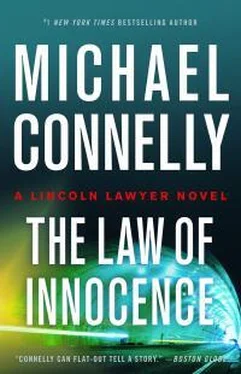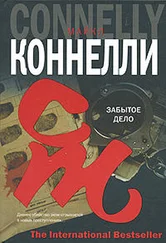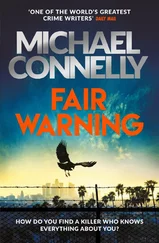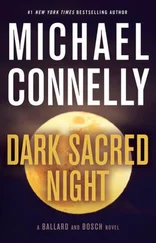“I didn’t kill Sam Scales. That’s why I’m here. I’m trying to find the person who did, and you just wasted a whole fucking day of my time and my investigator’s time. You may not believe me and I may even go down for it, but know this: there’s someone else out there who did it and walked away. And by not helping me, you help him.”
I got up and turned to the steel door, raising my arm to pound on it. I was frustrated and angry and wondering whether there would be an earlier flight back so that my entire day would not be wasted.
“Wait a minute,” Neiderland said.
I turned back to him.
“Prove it,” he said.
“That’s what I’m trying to do,” I said. “And it doesn’t help when I go off on a wild—”
“No, I mean prove it right here.”
“How do I do that?”
“Sit down.”
He nodded to the empty seat. I reluctantly sat down.
“I can’t prove it to you,” I said. “Not yet, at least.”
“He told me you betrayed him,” Neiderland said. “Yeah, the famous Lincoln Lawyer. You went Hollywood when they made a movie about your ass and left all the people who counted on you in the gutter.”
“That’s not what happened. I didn’t go Hollywood. Sam stopped paying me. That was one thing. But the truth is, I just couldn’t do it anymore. He was hurting a lot of people, taking their money, making them feel like fools. He got off on it, but I’d had enough. I couldn’t take another case.”
Neiderland didn’t respond. I tried again. I wanted to win him over because I still thought he could be helpful.
“You were really going to kill me?” I asked. “With less than two years to go in here?”
“I don’t know,” Neiderland said. “But I was going to do something. I was mad. I still am.”
I nodded. I could feel the temperature in the room subsiding.
“For what it’s worth, I liked Sam,” I said. “He ripped off a lot of people, and that was hard to take, but somehow I always liked him. I just had to draw the line because what he was doing was reflecting on me in the media and at home. Added to that, he stopped paying me and that was the same as treating me like one of the fools he ripped off.”
“He outstayed his welcome with a lot of people,” Neiderland said.
I could see a door of communication opening.
“But not you?” I asked.
“No, I never abandoned him,” Neiderland said. “And he never abandoned me. We had plans for when I got out of here.”
“What were they?”
“Find one big score and then disappear.”
“What was the score? Did he already find it?”
“I don’t know. It’s not like he could put it in one of his letters. Everything here is monitored—visitors, phone calls, letters. You’re not even supposed to have contact with any ex-cons on the outside.”
“So, how did you communicate?”
Neiderland shook his head. He wasn’t going to go there.
“Hey, I’m your lawyer,” I said. “You can tell me anything, and they can’t listen and I can’t repeat it. It’s privileged.”
Neiderland nodded and relented.
“He sent me letters,” he said. “Posing as my uncle.”
I paused for a moment. I knew the next question and answer could change everything about the case. I also knew that when people make up stories, plays, and even cons, they usually salt their stories with truth. Neiderland had promised Harry Bosch a name if I came to the prison. Maybe that was the truth in his con.
“What’s your uncle’s name?” I asked.
“Was,” Neiderland said. “He’s dead now. His name was Walter Lennon. My mother’s brother.”
“Did you ever send Sam letters—as your uncle?”
“Sure. What else is there to do in here?”
“And do you remember where you sent the letters?”
“He had a garage apartment in San Pedro. But that was three months ago, when he was alive. They probably put his shit out on the street.”
“Do you remember the address?”
“Yeah, I looked at a few of his letters this morning. The return was 2720 Cabrillo. He said it was small. He was saving and we were going to get something bigger when I got out. He said we’d buy a place.”
The vibe I was getting was that Neiderland was talking about a romantic relationship without actually saying it. I realized that I had never known Sam Scales’s sexual orientation because it didn’t play a part in his crimes or our attorney-client relationship.
“Did he tell you how he was getting the money he was saving?”
“He said he was working at the port.”
“Doing what?”
“He didn’t say and I didn’t ask.”
To Sam, working a job meant working a grift. I wrote the name and address down on my legal pad. It would be considered work product and not discoverable.
“Anything else you think I should know?” I asked.
“That’s it,” he said.
I thought about protecting the information I had just received—at least until we checked it out.
“An investigator from the LAPD might come to see you,” I said. “They think I killed Sam and that’s all they’re worried about. Just remember that you don’t have to talk to them. I’m your lawyer now, you can refer them to me.”
“I won’t tell them dick.”
I nodded. That was what I wanted.
“Okay, then,” I said. “I’m going to head back.”
“What about your trial?” Neiderland asked. “Do you want me to testify?”
I wasn’t sure how I could use him in my defense, or whether I could get the judge to approve it. Teleconferencing from prison to courtroom would probably put the jury to sleep. There was also the question of conflict of interest. Neiderland was now technically my client—at least on paper at the prison.
“I’ll let you know,” I said.
I stood up again, ready to bang on the door.
“Are you really going to find out who killed him?” Neiderland asked. “Or are you just worried about proving you didn’t?”
“The only way to prove I didn’t do it is to prove who did,” I said. “That’s the law of innocence.”
PART THREE
ECHOES AND IRON
24
Wednesday, January 15
We got down to San Pedro by 9:30 the next morning. We drove separately. I was driven by Bishop because I needed to get to downtown before 1 p.m. for the hearing on the missing wallet. Bosch came in his old Cherokee and Cisco on his Harley. We convened at the house on Cabrillo that Austin Neiderland had put me onto. There was an apartment for rent sign on the front lawn. Bishop had been cleared by Cisco but you can never be 100 percent sure about anything. I didn’t want him sitting in the Lincoln in front of the house. I told him to go get coffee nearby and wait for me to summon him when I was ready to go to court. I then approached the house with my investigators and knocked on the door. A woman in a bathrobe answered. I held up a business card and went with a script I had written in my head based on what I knew from Neiderland.
“Hello, ma’am, I’m Michael Haller, an attorney involved in the situation regarding the estate of Walter Lennon, and we are here to ascertain and review any property he left behind.”
“ ‘Estate’? Does that mean he’s dead?”
“Yes, ma’am, Mr. Lennon passed in late October.”
“Well, no one told us. We just thought he took off. He was paid up through November but then December went by and no sign of him and no rent check.”
“I see the sign out front. You are rerenting the apartment?”
“Of course. He was gone and he didn’t pay.”
“Are his belongings still in there?”
“No, we cleared him out. His stuff is in the garage. We wanted to dump it, but the law, you know. We have to wait sixty days.”
Читать дальше







![Майкл Коннелли - Christmas Even [Short story]](/books/390532/majkl-konnelli-christmas-even-short-story-thumb.webp)



